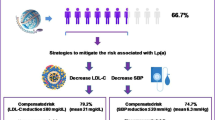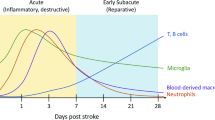Abstract
Background and aims
High levels of inflammatory markers shortly after an ischemic stroke are associated with a worse prognosis. Whether inflammatory markers predict long-term mortality in stroke-survivors is less clear. We examined whether a persisting inflammatory response (levels of inflammatory markers >1 year after the stroke event) was associated with long-term mortality.
Methods
We recruited participants from the Tromsø Study, Norway, in a nested case–control design. At baseline in 1997, white blood cell count (WBC), serum levels of fibrinogen, interleukin 6 (IL-6) and high sensitive C-reactive protein (hs-CRP) were analysed in 187 stroke-survivors, a median of 7.0 years (range 1–43) after the first-ever ischemic stroke, and in 243 stroke-free subjects. Cox proportional hazard regression model was used to examine whether inflammatory markers predicted all-cause mortality in both groups from 1997 to 2013.
Results
During an average of 16 years follow-up, 117 (62.5 %) stroke-survivors and 107 (44.0 %) stroke-free subjects deceased (p for differences 0.005). In stroke-survivors, fibrinogen and log IL-6 predicted all-cause mortality after adjustment for age, sex, BMI, smoking, Frenchay activity index, comorbidity and use of statins (HRs 1.26; 9 5 % CI 1.05–1.51 and 2.02; 95 % CI 1.12–3.64, respectively). In stroke-free subjects log hs-CRP predicted all-cause mortality after additionally accounting for levels of cholesterol, blood pressure and use of blood pressure lowering drugs (HR 1.95; 95 % CI 1.26–2.99).
Conclusions
Fibrinogen and IL-6 were independent predictors of mortality in long-term stroke-survivors, whereas elevated hs-CRP predicted mortality in stroke-free subjects. Mortality risk prediction in stroke-survivors differed from that of stroke-free subjects.

Similar content being viewed by others
Abbreviations
- BMI:
-
Body mass index
- WBC:
-
White blood cell count
- IL-6:
-
Interleukin 6
- hs-CRP:
-
High sensitive C-reactive protein
References
Olai L, Omne-Ponten M, Borgquist L et al (2009) Survival, hazard function for a new event, and healthcare utilization among stroke patients over 65 years old. Stroke J Cereb Circ 40:3585–3590. doi:10.1161/STROKEAHA.109.556720
Smith SC Jr, Collins A, Ferrari R et al (2012) Our time: a call to save preventable death from cardiovascular disease (heart disease and stroke). Circulation 126:2769–2775. doi:10.1161/CIR.0b013e318267e99f
Go AS, Mozaffarian D, Roger VL et al (2014) Heart disease and stroke statistics–2014 update: a report from the American Heart Association. Circulation 129:e28–e292. doi:10.1161/01.cir.0000441139.02102.80
Whiteley W, Jackson C, Lewis S et al (2009) Inflammatory markers and poor outcome after stroke: a prospective cohort study and systematic review of interleukin-6. PLoS Med 6:e1000145. doi:10.1371/journal.pmed.1000145
Kwan J, Horsfield G, Bryant T et al (2013) IL-6 is a predictive biomarker for stroke associated infection and future mortality in the elderly after an ischemic stroke. Exp Gerontol 48:960–965. doi:10.1016/j.exger.2013.07.003
Danesh J, Lewington S, Thompson SG et al (2005) Plasma fibrinogen level and the risk of major cardiovascular diseases and nonvascular mortality: an individual participant meta-analysis. JAMA 294:1799–1809. doi:10.1001/jama.294.14.1799
Rost NS, Wolf PA, Kase CS et al (2001) Plasma concentration of C-reactive protein and risk of ischemic stroke and transient ischemic attack: the Framingham study. Stroke J Cereb Circ 32:2575–2579
Harris TB, Ferrucci L, Tracy RP et al (1999) Associations of elevated interleukin-6 and C-reactive protein levels with mortality in the elderly. Am J Med 106:506–512
Stork S, Feelders RA, van den Beld AW et al (2006) Prediction of mortality risk in the elderly. Am J Med 119:519–525. doi:10.1016/j.amjmed.2005.10.062
Strandberg TE, Tilvis RS (2000) C-reactive protein, cardiovascular risk factors, and mortality in a prospective study in the elderly. Arterioscler Thromb Vasc Biol 20:1057–1060
Beamer NB, Coull BM, Clark WM et al (1998) Persistent inflammatory response in stroke survivors. Neurology 50:1722–1728
Whiteley W, Chong WL, Sengupta A et al (2009) Blood markers for the prognosis of ischemic stroke: a systematic review. Stroke J Cereb Circ 40:e380–e389. doi:10.1161/STROKEAHA.108.528752
Markaki I, Franzen I, Talani C et al (2013) Long-term survival of ischemic cerebrovascular disease in the acute inflammatory stroke study, a hospital-based cohort described by TOAST and ASCO. Cerebrovasc Dis (Basel, Switzerland) 35:213–219. doi:10.1159/000346094
Whiteley W, Jackson C, Lewis S et al (2011) Association of circulating inflammatory markers with recurrent vascular events after stroke: a prospective cohort study. Stroke J Cereb Circ 42:10–16. doi:10.1161/strokeaha.110.588954
Audebert HJ, Rott MM, Eck T et al (2004) Systemic inflammatory response depends on initial stroke severity but is attenuated by successful thrombolysis. Stroke J Cereb Circ 35:2128–2133. doi:10.1161/01.str.0000137607.61697.77
Winbeck K, Poppert H, Etgen T et al (2002) Prognostic relevance of early serial C-reactive protein measurements after first ischemic stroke. Stroke J Cereb Circ 33:2459–2464
VanGilder RL, Davidov DM, Stinehart KR et al (2014) C-reactive protein and long-term ischemic stroke prognosis. J Clin Neurosci 21:547–553. doi:10.1016/j.jocn.2013.06.015
Jacobsen BK, Eggen AE, Mathiesen EB et al (2011) Cohort profile: the Tromsø Study. Int J Epidemiol. doi:10.1093/ije/dyr049
Engstad T, Bonaa KH, Viitanen M (2000) Validity of self-reported stroke: The Tromso Study. Stroke J Cereb Circ 31:1602–1607
Engstad T, Viitanen M, Arnesen E (2003) Predictors of death among long-term stroke survivors. Stroke J Cereb Circ 34:2876–2880. doi:10.1161/01.str.0000101751.20118.c1
Krabbe KS, Pedersen M, Bruunsgaard H (2004) Inflammatory mediators in the elderly. Exp Gerontol 39:687–699. doi:10.1016/j.exger.2004.01.009
Vasto S, Candore G, Balistreri CR et al (2007) Inflammatory networks in ageing, age-related diseases and longevity. Mech Ageing Dev 128:83–91. doi:10.1016/j.mad.2006.11.015
Silvestri A, Gebara O, Vitale C et al (2003) Increased levels of C-reactive protein after oral hormone replacement therapy may not be related to an increased inflammatory response. Circulation 107:3165–3169. doi:10.1161/01.cir.0000074208.02226.5e
Wolf PA, Clagett GP, Easton JD et al (1999) Preventing ischemic stroke in patients with prior stroke and transient ischemic attack: a statement for healthcare professionals from the Stroke Council of the American Heart Association. Stroke J Cereb Circ 30:1991–1994
Gubitz G, Sandercock P (2000) Prevention of ischaemic stroke. BMJ (Clinical research ed) 321:1455–1459
Egido JA (2005) Benefits of modifying the predictive factors of stroke recurrence. Cerebrovasc Dis (Basel, Switzerland) 20:84–90. doi:10.1159/000089360
Bruunsgaard H, Ladelund S, Pedersen AN et al (2003) Predicting death from tumour necrosis factor-alpha and interleukin-6 in 80-year-old people. Clin Exp Immunol 132:24–31. doi:10.1046/j.1365-2249.2003.02137.x
Stoll G, Bendszus M (2006) Inflammation and atherosclerosis: novel insights into plaque formation and destabilization. Stroke J Cereb Circ 37:1923–1932. doi:10.1161/01.str.0000226901.34927.10
Watanabe K, Sugiyama S, Kugiyama K et al (2005) Stabilization of carotid atheroma assessed by quantitative ultrasound analysis in nonhypercholesterolemic patients with coronary artery disease. J Am Coll Cardiol 46:2022–2030. doi:10.1016/j.jacc.2005.04.070
Amarenco P, Bogousslavsky J, Callahan A 3rd et al (2006) High-dose atorvastatin after stroke or transient ischemic attack. N Engl J Med 355:549–559. doi:10.1056/NEJMoa061894
Huisa BN, Stemer AB, Zivin JA (2010) Atorvastatin in stroke: a review of SPARCL and subgroup analysis. Vasc Health Risk Manag 6:229–236
Author information
Authors and Affiliations
Corresponding author
Ethics declarations
Conflicts of interest
The authors declare that they have no conflict of interest. On behalf of all authors, the corresponding author states that there is no conflict of interest.
Ethical approval
All procedures performed in studies involving human participants were in accordance with the ethical standards of the institutional and/or national research committee and with the 1964 Helsinki declaration and its later amendments or comparable ethical standards. The study was approved by the Regional Committee of Medical and Health Research Ethics.
Informed consent
Informed consent was obtained from all individual participants included in the study.
Rights and permissions
About this article
Cite this article
Frøyshov, H.M., Bjørnerem, Å., Engstad, T. et al. Elevated inflammatory markers predict mortality in long-term ischemic stroke-survivors: a population-based prospective study. Aging Clin Exp Res 29, 379–385 (2017). https://doi.org/10.1007/s40520-016-0575-9
Received:
Accepted:
Published:
Issue Date:
DOI: https://doi.org/10.1007/s40520-016-0575-9




